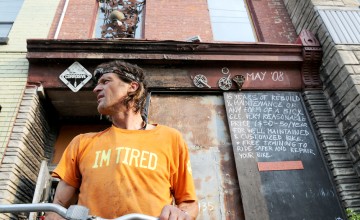
Igor Kenk outside his Queen West bike shop in a

BY ANTHONY REINHART
Last updated on Saturday, Sep. 19, 2009 03:09AM EDT
Crown delays in disclosing reams of evidence to the defence – from search warrant reports to police officers' notes to Mr. Kenk's bike-shop records – could lead a judge to throw the high-profile case out if they drag on, a legal expert warned yesterday.
“This [case] has the hallmarks of that danger,” said David Paciocco, a criminal law expert and professor at the University of Ottawa. “I'm not suggesting it's not well managed, but when you have multitransaction cases like this that involve a number of discrete offences all being prosecuted at the same time, you run into potential problems.”
Hints of these problems permeate a recent court filing obtained by The Globe and Mail, which includes an exhaustive, 23-page letter from Mr. Kenk's defence lawyer to the Public Prosecution Service of Canada.
In the Aug. 6 letter, written more than a year after Mr. Kenk's July, 2008, arrest, lawyer Lon Rose asked for dozens of pieces of potentially relevant disclosure material, and reiterated earlier requests for notes from many of the 94 police officers apparently involved in the case.
Mr. Rose also asked for the number of confidential informants police used; documents related to search warrants executed at a dozen addresses linked to Mr. Kenk; a police video interview with Mr. Kenk's common-law wife, Jeanie Chung; photographs related to the investigation; Mr. Kenk's pawn sheets and second-hand-dealer records and ownership documents and receipts used to identify some of the bicycles police seized.
“Please provide outstanding disclosure materials as soon as possible,” the lawyer wrote in conclusion. Mr. Rose declined further comment yesterday.
Disclosure delays are often cited by judges who throw out criminal proceedings for having taken too long to get to trial. An accused can apply for a stay of proceedings under the Charter of Rights and Freedoms, which enshrines the right to be tried within a reasonable time.
Mr. Kenk, who faces close to 100 charges mostly related to stolen bicycles and illegal drugs found at his properties, was freed on bail after his arrest, but has been in custody since December, when a minor assault charge led to his bail being revoked.
A preliminary hearing on the bicycle and drug charges, to determine whether a trial is warranted, is not scheduled to begin until February, by which time he may have spent more than a year in jail.
Mr. Paciocco said Mr. Rose's letter could lay the groundwork for a future Charter application to have Mr. Kenk's charges stayed, but pointed out that the Crown could point to the same letter, and its exhaustive list of requests, to justify the delay due to the work involved in fulfilling them.
“One of the problems with cases that involve multitransactions like this one is that they're huge and require tremendous logistics to administer,” he said.
Still, the longer Mr. Kenk waits for a trial, the weaker the Crown's position will become.
“If it gets to the point where maybe two or three years have gone by and there's been inactivity, it's not going to take much to persuade a judge” to grant a stay, Mr. Paciocco said.
Meanwhile, the lack of disclosure could also stall Ontario's civil case against Mr. Kenk, in which the province is trying to seize his bike shop, two pickup trucks and 2,292 bicycles as instruments and proceeds of crime.
Mr. Rose's letter surfaced in a filing connected to the civil case, in which Mr. Kenk stated his civil lawyer, Jacob Stilman, will be unable to provide an estimate of his legal work until he can review the criminal file. That review, Mr. Kenk said in an affidavit, depends on disclosure.
Mr. Paciocco said the commingling of the civil and criminal proceedings “really complicates matters” and is “an illustration how we can't keep these things as separate as we'd like to, and why it might not have been a great thing to have the province enter into this [civil court] exercise. But it is what it is.”